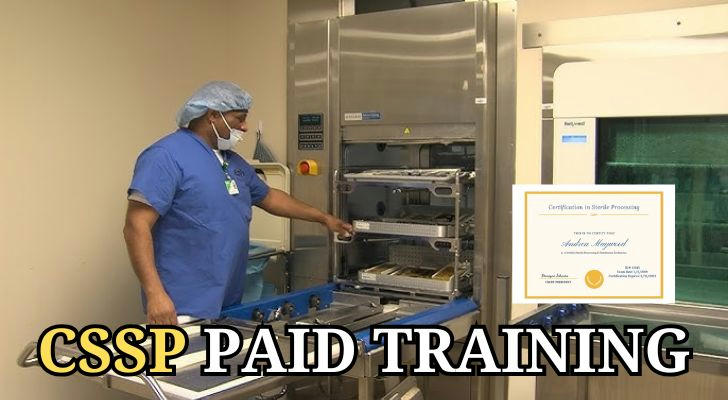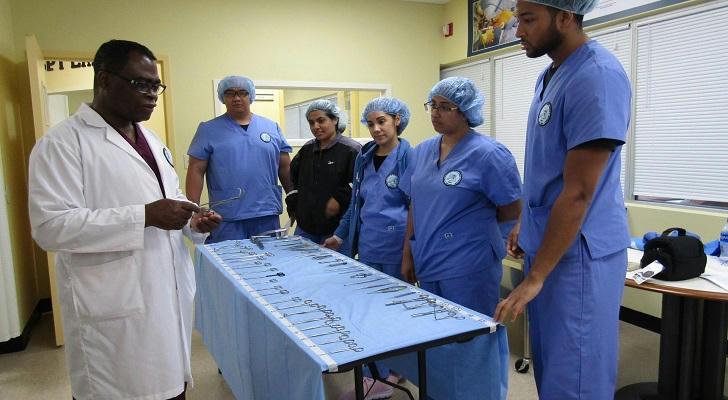Train for a High-Demand Healthcare Career: Enroll in a CSSP Technician Program Today
As healthcare systems across the United States expand to meet growing demands, Central Sterile Supply Processing (CSSP) technicians have become indispensable. These professionals are the unsung heroes behind every successful surgery, ensuring that surgical instruments and equipment are properly decontaminated, sterilized, and safe for use. With increasing surgical volumes and an aging population, the demand for trained sterile processing technicians is projected to grow steadily over the next decade.

Competitive Pay and Reliable Career Outlook
According to the U.S. Bureau of Labor Statistics (BLS), employment for medical equipment preparers, including CSSP technicians, is expected to grow by 10% between 2022 and 2032 — faster than the average for most occupations. This growth is largely driven by increased surgical needs, stringent infection control protocols, and the expansion of outpatient surgical centers.
The median annual wage for sterile processing technicians is approximately $47,000, but entry-level professionals typically start around $38,000 to $43,000 per year, depending on location. In metropolitan areas or large hospital systems, salaries can exceed $60,000 with experience and certification. Many positions offer full-time employment, health insurance, retirement plans, and paid time off, making it a financially stable and fulfilling career path.
What Do CSSP Technicians Do?
CSSP technicians are responsible for the critical task of sterilizing surgical tools, preparing equipment for operating rooms, and ensuring compliance with safety and sanitation regulations. Their duties typically include:
Cleaning and decontaminating surgical instruments
Operating autoclaves and other sterilization equipment
Assembling instrument trays and surgical packs
Ensuring compliance with CDC and OSHA sterilization standards
Managing inventory of sterile supplies and instruments
These tasks are essential to preventing hospital-acquired infections (HAIs), protecting patient health, and ensuring surgical teams can perform safely and efficiently.

Accessible Training with Government Support
Many states and healthcare institutions have partnered with Department of Labor (DOL)-registered apprenticeship programs to offer CSSP technician training. These programs typically last 6 to 12 months and combine classroom instruction with hands-on clinical experience in a hospital or medical center setting.
Students enrolled in these programs can benefit from:
Paid apprenticeships (earn while you train)
On-the-job mentorship from experienced sterile processing staff
Tuition subsidy or program sponsorship
Certification exam preparation, such as the CBSPD or CRCST
Some programs are backed by federal or state funding, particularly through Workforce Innovation and Opportunity Act (WIOA) grants, making the pathway into the profession more affordable for qualifying applicants. Veterans, career changers, and individuals from underserved communities are often prioritized for enrollment and funding support.
Industry-Recognized Certifications
Although not always mandatory to start, certification significantly boosts employability and salary potential. Two main credentials are recognized nationwide:
CBSPD (Certification Board for Sterile Processing and Distribution)
CRCST (Certified Registered Central Service Technician) by HSPA (formerly IAHCSMM)
Most employers prefer or require certification within the first year of employment. Training programs often align their curriculum to prepare students for these exams, covering:
Microbiology and infection control
Decontamination and sterilization techniques
Medical terminology and surgical instrumentation
Regulatory and safety compliance
Who Can Apply?
CSSP training programs are designed to be accessible to a wide range of applicants, including:
High school graduates or GED holders
Individuals with no prior healthcare experience
Career changers seeking a stable, high-demand job
Veterans transitioning to civilian careers
Older adults or returnees to the workforce
Many programs accommodate working adults by offering evening or part-time schedules.
Real Success Stories
Across the country, CSSP programs have helped thousands of individuals launch careers in the healthcare field. For example, in 2023, a hospital-based program in Texas reported that over 90% of its graduates secured full-time employment within three months, with many hired directly by their training hospitals. Similar results have been noted in Illinois, New York, and California.
Final Thoughts: A Smart Step into Healthcare
For those interested in joining the healthcare field without spending years in school, becoming a CSSP technician offers a fast, affordable, and rewarding path. With increasing demand, solid income, and strong job security, CSSP training is a practical choice for anyone seeking a stable career with purpose.

Ready to Begin?
Check with your local hospital, technical college, or state workforce development agency to find accredited CSSP training programs in your area. Many are currently enrolling and may offer paid training opportunities, subsidies, or certification support.
